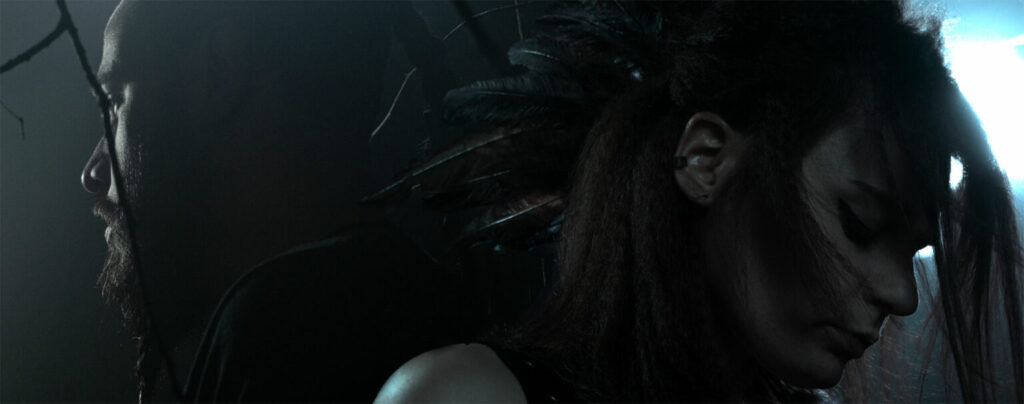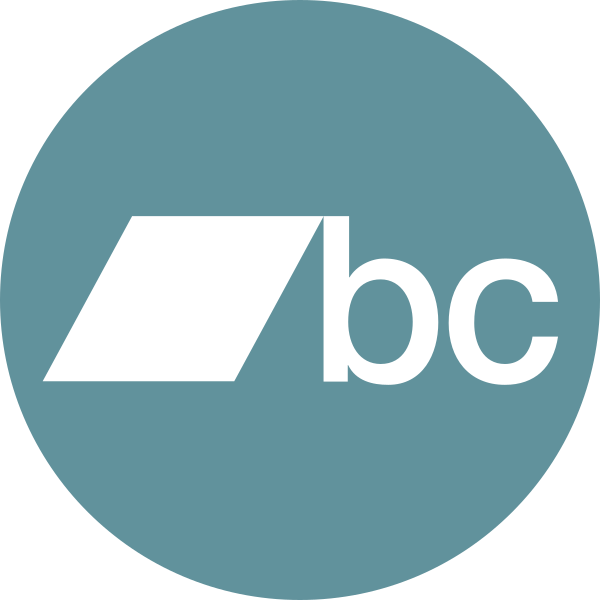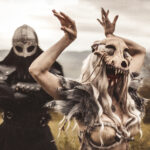Dark folk the nordic voice of the tagelharpa, the depth of ritual drums.
Our project fits within the veins of Dark Folk. Permeated by dark and nostalgic atmospheres, it is characterized by the fusion of somber synth architectures and chorals with the raw voices of ancient instruments, by the ritual call of heavy rhythms to the embrace of sound.
We are happy that you found the time for this written interview, we are all looking forward to hear more about your life and music carrier
I know your music very well, but I don’t know much about the persons behind it, would you like to tell us a little about yourself?
Of course! First of all, thank you, Dorthe, and Sound of Midgard for this interview. We are happy and honored.
We are Fabio and Camilla, born in ‘85 and ‘86, respectively, life and music partners. We are Italian and live at the foot of the Northern Apennine mountains, a place we deeply love, and which often is the theatre for our videos.
Your name “A Tergo Lupi” what does that mean?
“A Tergo Lupi” is the second part of a Latin saying, which in full reads: “A fronte praecipitium, a tergo lupi”: in front of you, the precipice; behind you, the wolves.
Does it have a special meaning for you?
Yes, when we had to name what, at the time, we were not yet fully aware we were building, we were going through a period that was not particularly “relaxing,” so to speak. We chose this name because we felt that these words could well describe how we were feeling, and it seemed appropriate to name a project that was being born at that moment, with some difficulties.
Time has passed, and the name has stayed with us as both a warning and encouragement. It reminds us that easy solutions, comfortable paths, or resolved pasts are rare. Cliffs cannot always be jumped, but wolves can be faced.
How long time have you played together?
We started trying to make music together when we met in 2011, but the real beginning can be dated to 2017, shortly before the birth of “A Tergo Lupi.”
What music inspire you and why?
In our first album, our background as listeners of industrial, electronic, some metal, and rock genres played a significant role. During the composition of Hide, those influences didn’t disappear entirely, but the predominant inspiration came from neofolk and its derivatives.
The list of musicians we follow and admire is very long, but it is impossible not to mention the importance of all the work by Einar Selvik. His gem, Wardruna, opened a door to wonderful worlds we didn’t even conceive of before, and that spoke to us so deeply in such an immediate and natural way.
Beyond that, we have many sources of inspiration. Even if they are far from our style or at a too high level to be impactful influences, they are fundamental in nurturing our work and pushing us to improve. Nine Inch Nails, Nick Cave, Tool, Rammstein, Dead Can Dance… some of our shared favorites.
Did you play other kind of music, before you started on the music that we know?
Fabio: Yes, I have loved making music since I was a child, and throughout my life I have explored many different and very diverse musical genres.
Camilla: Yes, I also started young and tried different things, but never translated into structured projects.
Have any of you ever played in other bands?
Fabio: Until a few years before the birth of ATL, I was part of an alternative electronic rock band from which I gained a lot of experience and wonderful memories. It was called “Unità di Distruzione del Suono” (which means: Sound Destruction Unit). There are still some traces of it on YouTube. Of course, I also had other minor experiences before that, but none worth mentioning.
Camilla: My path was mostly solitary until I met Fabio.
How many instruments do you play and which ones?
Fabio: In my case, it would be more correct to say: instruments I enjoy playing. My favorite instruments are the drum and bass guitar. In ATL, I mainly play drums and percussion.
Camilla: Over time, I have had experiences with wind and string instruments, but today I would say that my main instruments remain the piano and the tagelharpa, this one as self-taught.
Any plans about learning to play a new instrument?
Fabio: I am very fascinated by wind instruments like horns and trumpets. I would like to practice more, but my neighbors might not agree.
Camilla: Periodically, I fall in love with a new instrument and decide that it is absolutely necessary for me to learn to play it. Unfortunately, time, space, and energy are limited, and my infatuations fade. Two of my recurring regrets are the violin, which was my grandmother instrument, and not knowing how to play, even just a little, the guitar.
Did any of you have any kind of music education, or did you learn by yourself?
Fabio: I only have a brief background of three years in classical guitar and basic music theory, very limited and from a long time ago. Over the years, I’ve dabbled with other instruments as a self-taught musician. Camilla: I was lucky to be born into a family of musicians and music enthusiasts. I started at a young age, playing the saxophone in my hometown’s band. 🙂
As I grew up, I switched to the piano and pursued a classical path, enrolling in the conservatory where I studied for some years. Later, I continued outside of it, in a much more unstructured way to be honest, but that allowed me to discover a sense of freedom in practice and study that the rigid and demanding classical course had never left to me. I owe so much to my classical studies and just as much to all the musicians I met outside that environment.
I know you have made collabs with other musicians, would you like to tell a little about that and maybe with whom you have done collabs with?
Yes, we collaborated with Bjorth on the song Nornir and with Gealdýr on the song Inn Rìki. In both cases, it was a wonderful experience, and the best part was getting to know amazing people with whom a friendship was born that we still maintain today.
Would you do more collabs.?
Yes, and in fact, there are already musicians with whom we’ve shared the intention of working together. None of these projects have moved beyond the embryonic (or even pre-embryonic) stage yet, so unfortunately, we don’t have anything to reveal at the moment. Collaborations are both inspiring and valuable to us, as they allow us to connect with and get to know people we admire. However, they’re not something we accept or propose easily, both due to limited time and our personal vision for our projects.
Do you have a favorite band or musician that means more to you than others?
Fabio: Over the years, discovering new music and artists that leave you in awe has led to a growing list of favorite bands. Many of them, as is natural, have evolved over time, and not all have taken a direction that still appeals to me. Some remain only as fond memories of the times when I adored them (for me, Muse and Radiohead are good examples of this). For other bands, even if they’ve changed in a way I no longer enjoy as much, I still recognize their importance or brilliance (I’d mention Rammstein and NIN, particularly Trent Reznor).Then there are those that never disappoint me (Depeche Mode, for example) perhaps because they manage to immerse me in a variety of sounds and atmospheres that I absolutely love.
Today, the artists who mean the most to me are: Trent Reznor because he opened the doors of sound experimentation for me. From him, I learned how crucial micro-details are, how even a seemingly insignificant sound can actually be the key to making a flat track interesting. Einar Selvik, particularly with Wardruna, for obvious reasons. He practically created a new genre, which I fell in love with from the very first listen. He brought me a completely new wave of inspiration that, within just a few years, literally changed my life.
Camilla: Yes, there have been bands, musicians, and albums that have left a deep mark over time. It’s difficult to choose. The first ones I must mention are definitely Muse, with Origin of Symmetry and Hullabaloo. I memorized them, wore them out, Origin of Symmetry was my obsessive soundtrack for years. Ataraxia, another band to whom I owe a lot. They opened new worlds of music and atmospheres for me. Nine Inch Nails, I deeply love and admire his work. Since I discovered it, I never stopped listening and became maybe the project I most often listen to. And finally, of course, Wardruna, without whom I wouldn’t be here now. I first discovered the work of Einar Selvik with the album “Skuggsjá”, with Ivar Bjørnson, and it was instant love at first seconds.
Have you made your own instruments?
For the most part, yes. Every tagelharpa, drum, rattle, bullroarer, and scheitholt used for A Tergo Lupi was made by Camilla. In fact, we could say that it’s Camilla’s instruments that created A Tergo Lupi. Ebanisteria Musicale C.M. Ferrari and its instruments actually came first, and it was with them that we started shaping our music. Even many of the seemingly electronic sounds are actually created by sampling our own instruments. We really enjoy crafting bass drones by layering multiple samples of Tagelharpa, horns, vocals, and other elements, then processing and altering them until we achieve the sound that best fits the song we’re working on. This approach slows us down a bit, but it also allows us to develop a more personal sound identity.
Where do you typically get your inspiration to compose/ produce music?
A very beautiful but difficult question, because we don’t have a set habit or routine.
Often, our songs are born from the need to express, communicate and translate into music something that is anguishing, tormenting us, or insisting in our mind, also in a positive way. Sometimes, the rarest and most special, a melody emerges on its own, raw and unfiltered, as if it had a life of its own. More often, we spend a long time searching for the right key (made of sounds, melodies, and words) to best convey what we want to express.
It’s a long process. We deeply care about ensuring that every sound, atmosphere, harmony and word connects coherently and represents as faithfully as possible what we wish to communicate in musical form .Inspiration, or the solution to these dilemmas, often comes when we’re away from home, as if removing pressure allows the mind and soul to be freer. We know this is common for many musicians, just like the tendency to let inspiration slip away because we rely on unreliable memory instead of forcing ourselves to capture it somehow, like with a recorder. 🙂
Are you a believer of the Nordic/old ways or finding the history interesting?
Fabio: Personally, I don’t follow a religion, but I envy those who do. I’m a pragmatic person, but I recognize that everyone experiences or seeks spirituality in their own way, sometimes shaped by imposed beliefs, other times through more personal journeys.
In my case, I wish people lived more connected to nature, which, from my perspective, doesn’t mean going back to living in wooden huts in the woods, hunting, or farming to survive. I’m a fan of progress and technology, but I believe we can and must evolve while still respecting and protecting the ecosystem around us. As for history, I find it extremely fascinating, it’s the record of human evolution in all its aspects, from social to technological, and for me, that’s incredibly interesting. Unfortunately, I have to admit that I’m not great at diving deep into subjects. I’m very curious, but about so many things that I end up constantly jumping from one interesting topic to another without ever truly delving into them.
Blame it on time, whether it exists or not, there’s never enough of it.
Camilla: No, I don’t follow a belief or religion. I do feel the need for a deeper, more spiritual care of myself, but I fear that, for me, the only way is through personal exploration. For this reason, I believe that studying and approaching ancient knowledge is important to support, nourish, and guide this search. Symbolism, our relationship with the animal and plant worlds, the old stories, still speak to us.
My first opportunity to get closer to the Nordic world came actually through an historical research on some musical and cultural aspects. Even though my job ended up being completely different, I studied archaeology at university, and I truly believe that history and understanding the past are crucially important today.
Do you find it challenging times in the music industry with YT and other streaming places?
It’s a huge and complex topic. Being a musician, like any artistic profession and beyond, has always been challenging, and it still is. However, as far as we’re concerned, we wouldn’t trade the current situation for any from previous years.
Today, home recording equipment is far more accessible, both financially and in terms of usability, even for self-taught musicians and with excellent results. This is something that would have been unthinkable just a few decades ago. Thanks to the internet, streaming platforms and social media, anyone can share their work with a vast audience at a fraction of the cost. The wide number of independent musicians emerging in recent years proves this.
Not so long ago, recording an album was way more expensive, distribution was far more difficult, and the only way to get heard was by playing live, maybe in random, not frequent situations that didn’t always offer great opportunities. Nowadays, artists can still work with labels if they believe it’s the best choice for their projects, willingly giving up a portion of their earnings in exchange for support in many challenging aspects of the industry. But they also have the freedom to present themselves to the world independently, without intermediaries, maintaining full artistic control, and we think that’s extraordinary.
The price of independence is that, beyond the artistic side, one has to commit to every practical aspect: production, recording, editing, distribution, taxation, and if desired, even promotion. But there’s no job, profession, career, or even hobby that consists solely of artistic and pleasant side.
It’s demanding, but we firmly believe that this is the best path for us.
Do you have any advice for others what to do?
It might sound like a cliché, but it really isn’t: the first thing we deeply believe, is that when starting making music it’s crucial to do it for ourselves, because it make us feel better, because we feel the need for it, because it’s a way for us to express ourselves, to vent, to have fun, and release emotions.
Sincere, genuine music will undoubtedly convey emotions to someone else too, and if it sincerely resonates with even one person, know that there are thousands out there who could feel the same way.
We try to be very, very self-critical, and as frustrating as it can be sometimes, we believe it’s essential. Listening to our music as honestly as possible, admitting whether we’ve done a good job or if we can do better, and trying to understand what is there in the songs of the bands we like that is missing in ours.
The fundamental question: “Would this song speak to me? Would I listen to it if someone else had made it?”
In a world now full of talented and beautiful musical projects, bands, musicians and singers, if someone decides to spend some of their time giving our music a chance, it’s a precious gift. We believe it’s necessary to always remember that.
What is working best for you?
In our case, proposing our music through YouTube videos has definitely played an important role. We started with very simple videos, using an old worksite light and a smartphone. 🙂
Then, we became fascinated by the video aspect itself and invested time, resources, and energy into this path. Over time, we equipped ourselves better, became more passionate about it, and videos have now become a crucial medium not just to accompany our music, but to transmit its essence, not only through sound but also through images.
It has required and still requires a lot of effort, time, and commitment to improve the filming, space and place management, the use of lights, editing software’s, it’s tiring and complicated but, even in this case, at this point we could never imagine not handling it ourselves. They’ve become an integral part of our language.
Can it be hard to find time for the music and the balance between music/family life and other things in life? (many feel they have to little time to make their music)
Well…definitely yes!
As we mentioned earlier, we handle every aspect ourselves: composition, lyrics, arrangement, recording, mixing, mastering… and all the video production: basic ideas, location scouting, recce, test shots, possible costumes or props, final filming (with all the limitations given by weather conditions), editing, coloring, and, if necessary, some small VFX.
It’s always just the two of us doing everything ourselves. We have so much fun with it, but it also takes weeks of work for a single video, and months when it also involves composing and recording the track.
Right now, we’re trying to change things a bit to take better care of ourselves, but considering that until last year we both had full-time jobs, free time didn’t really exist for many years. 🙂
Do you have other interest like crafting, painting or carving?
Fabio: My favorite hobby is playing video games, which, in some cases, have also inspired me musically. Another strong passion I’ve always had is martial arts. I was lucky enough to share this passion with Camilla. For several years we practiced traditional Kung Fu, and in smaller doses, we also did some combat sports like Sanda (similar to kickboxing). Now that I’m getting older, as a true Italian, I enjoy making pizza.
Camilla: Besides the sport Fabio mentioned, I enjoy drawing. And of course, eating the pizzas Fabio makes. 😊
You just released “ In Veins” and “Heimweh”, is there an EP or album on the way soon?
Yes, we’re working hard on the next album and the next single; we hope to have news about it very soon. 🙂
We would like to thank you both for answering our questions about your music, and glad we could do this written interview, and I am sure many are happy to get to know you better….
LINKS:





